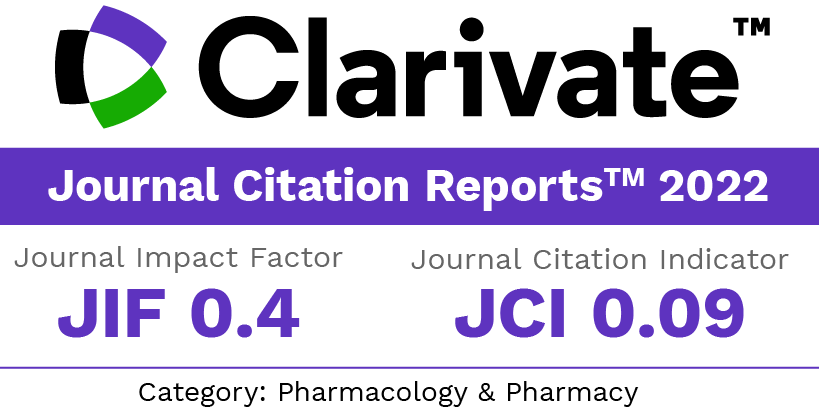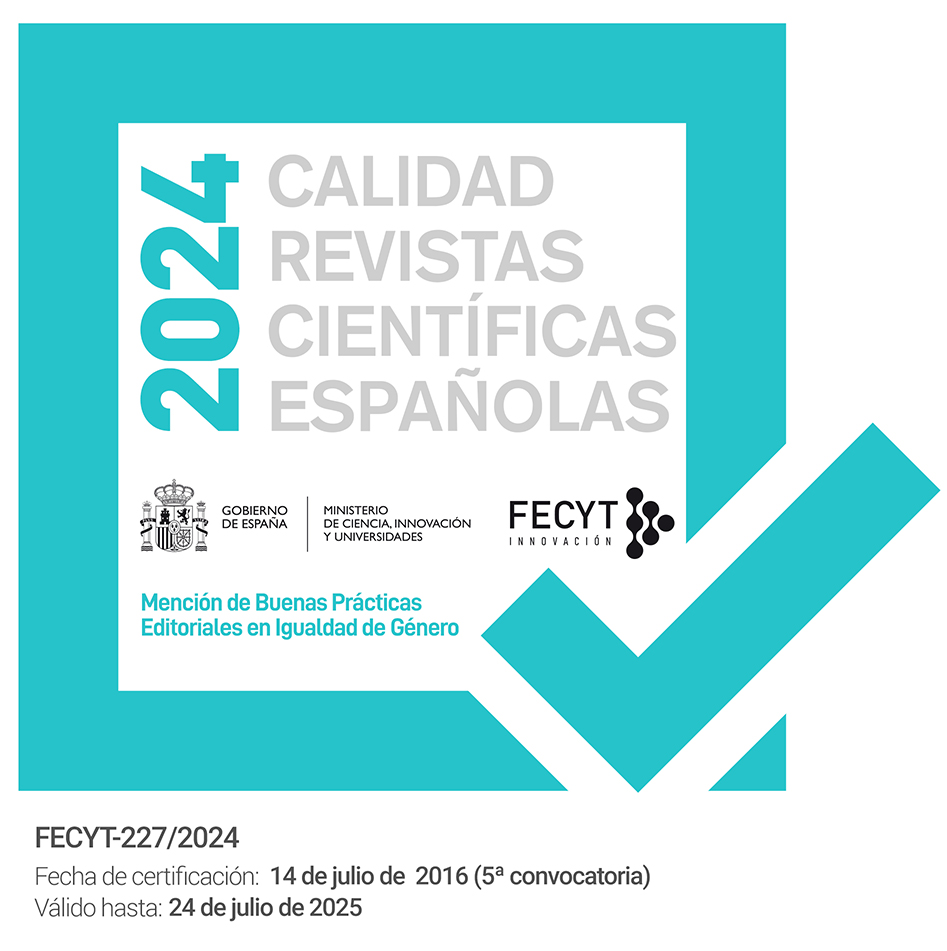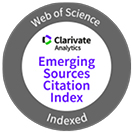Therapeutic advances in the management of anal fissures: exploring the synergy between Pharmacology and Nanotechnology
DOI:
https://doi.org/10.30827/ars.v65i4.30928Keywords:
Anal fissure, Pharmacology, NanotechnologyAbstract
Introduction: Anal fissure is a common proctological condition characterized by painful lesions caused by hypertonia of the internal anal sphincter smooth muscle. Despite its impact, conventional treatments available may be limited in terms of reproducibility, efficacy, and long-term tolerability. Therefore, exploring new pharmacological therapies, in sync with nanocarriers enabling their specific targeting to the site of action, offers a potential alternative to improve its treatment.
Method: This study adopts a retrospective and longitudinal approach.
Results: Different therapeutic approaches are applied, ranging from hygienic-sanitary measures and non-invasive pharmacological treatments to surgery, most of them aimed at reducing hypertonia. The most commonly used drugs in hospitals are lidocaine, diltiazem, nifedipine, nimodipine, isosorbide nitrate, and botulinum toxin. Leveraging the advantages of pharmaceutical nanotechnology to enhance therapeutic efficacy, reduce adverse effects from systemic administration, and increase healing rates, studies have been found on the application of polymeric nanoparticles, vesicular nanoparticles, and micro-nano emulsions to deliver drugs for the symptomatic treatment of anal fissure. Some formulations are already authorized for use, while others are still under research.
Conclusions: It has been demonstrated that new formulations, especially those based on nanotechnology, show significant potential in improving the healing of fissures compared to conventional treatments. However, further studies on the safe use of these systems are necessary before their widespread clinical implementation.
Downloads
References
Ebinger SM, Hardt J, Warschkow R et al. Operative and medical treatment of chronic anal fissures-a review and network meta-analysis of randomized controlled trials. J Gastroenterol. 2017; 52(6):663–676. doi: 10.1007/s00535-017-1335-0 DOI: https://doi.org/10.1007/s00535-017-1335-0
Arroyo A, Montes E, Calderón T, Blesa I, Elía M, Salgado G, et al. Treatment algorithm for anal fissure. Consensus document of the Spanish Association of Coloproctology and the Coloproctology Division of the Spanish Association of Surgeons. Cirugia Española. 2018 96(5):260–7. doi: 10.1016/j.ciresp.2018.02.007 DOI: https://doi.org/10.1016/j.cireng.2018.05.008
Martinena Padial E, Pozuelos Estrada J, Fernández Díaz J y Marín Lencero L. Las fisuras anales. Med Integral [internet]. 2001; 37(4):170-191. [citado 26 de febrero de 2024]. Disponible en: https://www.elsevier.es/es-revista-medicina-integral-63-articulo-las-fisuras-anales-10021659
Opazo J. Estudio de la fisiología del esfínter anal interno porcino y de la rata, y de la fisiopatología de las alteraciones de la motilidad del esfínter anal interno en pacientes con fisura anal. 2012 [citado 27 de febrero de 2024]; Disponible en: https://ddd.uab.cat/record/101090
Latif JA, Sánchez Zuazo I y Rodríguez Martín JA. Fisura anal, opciones terapéuticas actuales. Rev Argent Coloproctol [Internet]. 2008;1-12. [citado 27 de febrero de 2024]. Disponible en: https://pesquisa.bvsalud.org/portal/resource/pt/lil-574118
Godeberge P. Fisuras anales. EMC - Tratado Med [internet]. 2022; 26(3):1-6. doi: 10.1016/S1636-5410(22)46830-9 DOI: https://doi.org/10.1016/S1636-5410(22)46830-9
Fernández MC. Prevalencia de cirugía coloproctológica en el Hospital Salvador B. Gautier, República Dominicana, del 2000-2010. [Internet]. Universidad Nacional Pedro Henríquez Ureña; 2013 [citado 27 de febrero de 2024]. Disponible en: https://repositorio.unphu.edu.do/handle/123456789/4939
Schlichtemeier S y Engel A. Anal fissure. Aust Prescr. 2016;39(1):14-17. doi: 10.18773/austprescr.2016.007. DOI: https://doi.org/10.18773/austprescr.2016.007
Ramos MZV, Ruiz GMB, Naspud GAU, Nicolalde LCP y Cruz EYÁ. Urgencias proctológicas, su abordaje en áreas de emergencia. Tesla Rev Científica [Internet]. 2023; 3(2):e235-e235 [citado 27 de febrero de 2024]. Disponible en: https://tesla.puertomaderoeditorial.com.ar /index.php/tesla/article/view/235 DOI: https://doi.org/10.55204/trc.v3i2.e235
Hornez E, Desfemmes FR, Werkoff G et al. Principios del tratamiento quirúrgico de los traumatismos anorrectales y de los órganos genitales. EMC - Téc Quirúrgicas - Apar Dig. 2016; 32(4):1-15. doi: 10.1016/S1282-9129(16)80544-9. DOI: https://doi.org/10.1016/S1282-9129(16)80544-9
Van Outryve M. Physiopathology of the anal fissure. Acta Chir Belg. 2006; 106(5):517–518. doi: 10.1080/00015458.2006.11679942 DOI: https://doi.org/10.1080/00015458.2006.11679942
Furusho JKY, Adame EC, Elizondo GV y Troche JMR. Neurogastroenterología y motilidad gastrointestinal CMG 3. Editorial Alfil; 2023. 334 p.
Basany EE. Manejo de la fisura anal [Internet]. Butlletí d´informació terapéutica. 2014; 25(6). [citado 27 de febrero de 2024]. Disponible en: https://scientiasalut.gencat.cat/bitstream/handle/11351/958/BIT_2014_25_06_cas.pdf?sequence=9&isAllowed=y
Ortiz Agustín JJ. Concordancia entre el diagnóstico de envío y definitivo en la consulta externa de cirugía de colon y recto de CMN Puebla entre el periodo 2016-2018. 2019 [citado 27 de febrero de 2024]; Disponible en: https://hdl.handle.net/20.500.12371/14515
Jiménez-Ruz A. Repercusión del proceso del parto en la salud sexual de la mujer. Impact of the birth process on the sexual health of women [Internet]. 2021 [citado 27 de febrero de 2024]; Disponible en: http://helvia.uco.es/xmlui/handle/10396/21429
Brown AC, Sumfest JM y Rozwadowski JV. Histopathology of the internal anal sphincter in chronic anal fissure. Dis Colon Rectum. 1989; 32(8):680–683. doi:10.1007/BF02555773 DOI: https://doi.org/10.1007/BF02555773
Pizzorno JE, Murray MT y Joiner-Bey H. 68 - Proctologic conditions. The Clinician’s Handbook of Natural Medicine, 3ª ed. [Internet]. Edinburgh: Churchill Livingstone; 2016.pp.843–853. doi:10.1016/B978-0-7020-5514-0.00077-4 DOI: https://doi.org/10.1016/B978-0-7020-5514-0.00077-4
Kent I, Gilshtein H, Wexner SD, Kent I, Gilshtein H y Wexner SD. Fisura anal: anatomía, patogenia y tratamiento. Rev Argent Cir [Internet]. 2020; 112(4):388-397. doi: 10.25132/raac.v112.n4.anwex. DOI: https://doi.org/10.25132/raac.v112.n4.anwex
Rovelo JMC. Cirugía gastrointestinal. Guía práctica. Editorial Alfil; 2023. 378 p.
Mapel DW, Schum M y von Worley A. The epidemiology and treatment of anal fissures in a population-based cohort. BMC Gastroenterol. 2014; 14(1). doi: 10.1186/1471-230X-14-129 DOI: https://doi.org/10.1186/1471-230X-14-129
Rintala RJ y Pakarinen MP. Other Disorders of the Anus and Rectum, Anorectal Function. Pediatr Surg. 2012; 2:1311–1320. doi: 10.1016/B978-0-323-07255-7.00104-5. DOI: https://doi.org/10.1016/B978-0-323-07255-7.00104-5
Hequera JA, Obregón G, Banchero L y Arece S. Adenocarcinoma mucinoso primario de glándulas anales. Rev Mex Coloproctol [Internet]. 2007; 13(2):66-71. [citado 27 de febrero de 2024]. Disponible en: https://www.medigraphic.com/cgi-bin/new/resumen.cgi?IDARTICULO=12883
Carro García V. Evaluación de la calidad de vida en los pacientes con fisura anal crónica y esfinterotomía lateral interna. 2008 [citado 27 de febrero de 2024]. Disponible en: http://hdl.handle.net/10550/15901
Piedra J, Samaniego Vallejos F, Valenzuela W, Medina W y Macías ZJ. Prevalencia y tratamiento de fisura anal en el Hospital Provincial de Cotopaxi.1997; s/f. 16(16). Disponible en: https://pesquisa.bvsalud.org/portal/resource/pt/lil-297188
Vera Quiñonez FA y Zambrano Mendoza CA. Patologías anorrectales más frecuentes en pacientes VIH/sida [Internet]. 2022 [citado 27 de febrero de 2024]. Disponible en: http://repositorio.ug.edu.ec/handle/redug/68245
Alonso-Coello P, Marzo-Castillejo M, Mascort JJ et al. Clinical practice guidelines on the management of hemorrhoids and anal fissure (updated 2007). Gastroent Hepat. 2008; 31(10):668–681. doi: 10.1016/S0210-5705(08)75815-1 DOI: https://doi.org/10.1016/S0210-5705(08)75815-1
Carro García V. Evaluación de la calidad de vida en los pacientes con fisura anal crónica y esfinterotomía lateral interna. 2008 [citado 27 de febrero de 2024]. Disponible en: http://hdl.handle.net/10550/15901
Oumar T, Diarra AS, Tembiné K et al. Epidemiological and clinical profile of primary anal fissures in the hospital of Sikasso. PAMJ-Clin Med. 2022; 10(6). doi: 10.11604/pamj-cm.2022.10.6.35453 DOI: https://doi.org/10.11604/pamj-cm.2022.10.6.35453
Tovar Martínez E. Eficacia de la electroacupuntura en pacientes geriátricos con estreñimiento [Internet]. 2019 [citado 27 de febrero de 2024]. Disponible en: http://eprints.uanl.mx/18691/
Llorca Cardeñosa S. Estudi dels mecanismos fisiopatológics de la incontinència fecal. 2012 [citado 27 de febrero de 2024]; Disponible en: https://ddd.uab.cat/record/102004
Salati SA. Anal Fissure - an extensive update. Pol Przegl Chir. 2021; 93(4):46-56. doi: 10.5604/01.3001.0014.7879
Wong UR. Fisura anal: Alternativas de tratamiento farmacológico. Rev Hosp Juárez México [Internet]. 2008; 75(2):122-125 [citado 27 de febrero de 2024]. Disponible en: https://www.medigraphic.com/cgi-bin/new/resumenI.cgi?IDARTICULO=42184
Aguirre D, Archila PE, Carrera J et al. Consenso Colombiano de Enfermedad Inflamatoria Intestinal. Rev Colomb Gastroenterol [Internet]. 2012; 27:s1-44 [citado 27 de febrero de 2024]. Disponible en: http://www.scielo.org.co/scielo.php?script=sci_abstract&pid=S0120-99572012000500001&lng=en&nrm=iso&tlng=es
Narváez CEQ, Erazo AMG, Torres KER et al. Abordaje Integral de la Enfermedad Inflamatoria Intestinal: Cirugía y Medicina Interna en Sintonía. Tesla Rev Científica [Internet]. 2023; 3(2):e274-e274. [citado 27 de febrero de 2024]. Disponible en: https://tesla.puertomaderoeditorial.com.ar/index.php/tesla/article/view/274 DOI: https://doi.org/10.55204/trc.v3i2.e274
Gogoi P, Kaur G y Singh NK. Nanotechnology for colorectal cancer detection and treatment. World J Gastroenterol. 2022; 28(46):6497. doi: 10.3748/WJG.V28.I46.6497 DOI: https://doi.org/10.3748/wjg.v28.i46.6497
Huang Y, Guo X, Wu Y et al. Nanotechnology’s frontier in combatting infectious and inflammatory diseases: prevention and treatment. Signal Transduct Target Ther. 2024; 9(1):34. doi: 10.1038/s41392-024-01745-z DOI: https://doi.org/10.1038/s41392-024-01745-z
Jordi C, Laia F y Climent F. Investigación cualitativa longitudinal. CIS- Centro de Investigaciones Sociológicas. 2014. 154 p.
Izcara Palacios SP. Manual de investigación cualitativa [Internet]. 2014 [citado 25 de mayo de 2023]. Disponible en: https://repositorio.minedu.gob.pe/handle/20.500.12799/4613
Pérez Peña J. Eficiencia en el uso de los medicamentos. Rev Cuba Farm [Internet]. 2003 [citado 27 de febrero de 2024];37(1):0-0. Disponible en: http://scielo.sld.cu/scielo.php?script=sci_abstract&pid=S0034-75152003000100004&lng=es&nrm=iso&tlng=es
Bobkiewicz A, Francuzik W, Krokowicz L et al. Botulinum Toxin Injection for Treatment of Chronic Anal Fissure: Is There Any Dose-Dependent Efficiency? A Meta-Analysis. World J Surg. 2016; 40(12):3064-3072. doi: 10.1007/s00268-016-3693-9. DOI: https://doi.org/10.1007/s00268-016-3693-9
Munilla GM. Factores alimentarios y farmacológicos que influyen en la prevalencia de constirpación en adultos mayores que concurren al Hogar Geriátrico Municipal Nuestra Señora del Huerto durante los meses de Octubre a Diciembre del año 2018 [Internet]. Tesis Doctoral. Universidad de Concepción del Uruguay. 2019 [citado 27 de febrero de 2024]. Disponible en: http://repositorio.ucu.edu.ar/xmlui/handle/522/127
hoja-para-el-paciente-de-jama-140319.pdf [Internet]. [citado 27 de febrero de 2024]. Disponible en: https://sites.jamanetwork.com/spanish-patient-pages/2014/hoja-para-el-paciente-de-jama-140319.pdf
Salati S. Anal Fissure – an extensive update. Pol J Surg. 2021; 93(4):46-56. doi: 10.5604/01.3001.0014.7879. DOI: https://doi.org/10.5604/01.3001.0014.7879
Salem AE, Mohamed EA, Elghadban HM y Abdelghani GM. Potential combination topical therapy of anal fissure: Development, evaluation, and clinical study. Drug Deliv. 2018; 25(1):1672–1682. doi: 10.1080/10717544.2018.1507059 DOI: https://doi.org/10.1080/10717544.2018.1507059
Katsinelos P, Kountouras J, Paroutoglou G et al. Aggressive treatment of acute anal fissure with 0.5 % nifedipine ointment prevents its evolution to chronicity. World J Gastroenterol [Internet]. 2006; 12(38):6203-6206 doi: 10.3748/wjg.v12.i38.6203. DOI: https://doi.org/10.3748/wjg.v12.i38.6203
Ghlichloo I y Gerriets V. Nonsteroidal Anti-Inflammatory Drugs (NSAIDs). En: StatPearls [Internet]. Treasure Island (FL): StatPearls Publishing; 2024 [citado 11 de marzo de 2024]. Disponible en: http://www.ncbi.nlm.nih.gov/books/NBK547742/
Newman M y Collie M. Anal fissure: Diagnosis, management, and referral in primary care. Br J Gen Pract. 2019; 69(685):409–410. doi:10.3399/bjgp19X704957 DOI: https://doi.org/10.3399/bjgp19X704957
Coloma M, Duffy LL, White PF, Kendall Tongier W y Huber PJ. Dexamethasone Facilitates Discharge After Outpatient Anorectal Surgery. Anesth Analg. 2001; 92(1). doi: 10.1097/00000539-200101000-00017. DOI: https://doi.org/10.1097/00000539-200101000-00017
Gabros S, Nessel TA y Zito PM. Topical Corticosteroids. En: StatPearls [Internet]. Treasure Island (FL): StatPearls Publishing; 2024 [citado 11 de marzo de 2024]. Disponible en: http://www.ncbi.nlm.nih.gov/books/NBK532940/
Karapolat B. Could local antibiotics be included in the treatment of acute anal fissure? Turk J Surg. 2018; 34(4):286–289. doi: 10.5152/turkjsurg.2018.3988 DOI: https://doi.org/10.5152/turkjsurg.2018.3988
Mert T. The importance of topical metronidazole in the treatment of acute anal fissure: a double-blind study controlled for prospective randomization. Ann Coloproctol. 2023; 39(2):31–138. doi: 10.3393/AC.2021.00675.0096 DOI: https://doi.org/10.3393/ac.2021.00675.0096
Bandyopadhyay D. Topical Antibacterials in Dermatology. Indian J Dermatol. 2021; 66(2):117-25. doi: 10.4103/ijd.IJD_99_18. DOI: https://doi.org/10.4103/ijd.IJD_99_18
Shrestha SK, Thapa PB, Maharjan DK y Tamang TY. Effectiveness of 0.2 % Glyceryl Trinitrate and 0.5 % Nifedipine in the Treatment of Chronic Anal Fissure. J Nepal Med Assoc. 2017; 56(205):149-152. doi: 10.31729/jnma.2990 DOI: https://doi.org/10.31729/jnma.2990
Tranqui P, Trottier DC, Victor C y Freeman JB. Nonsurgical treatment of chronic anal fissure: nitroglycerin and dilatation versus nifedipine and botulinum toxin. Can J Surg. 2006; 49(1):41-45. Disponible en: https://www.ncbi.nlm.nih.gov/pmc/articles/PMC3207506/
Ågren MS, Phothong N, Burian EA, Mogensen M, Haedersdal M y Jorgensen LN. Topical Zinc Oxide Assessed in Two Human Wound-healing Models. Acta Derm Venereol [Internet]. 2021; 66(2):117-125. doi: 10.2340/00015555-3829. DOI: https://doi.org/10.2340/00015555-3829
Higuero T. Update on the management of anal fissure. J Visc Surg. 2015; 152(2):S37–S43. doi: 10.1016/j.jviscsurg.2014.07.007 DOI: https://doi.org/10.1016/j.jviscsurg.2014.07.007
Paul AK, Smith CM, Rahmatullah M et al. Opioid Analgesia and Opioid-Induced Adverse Effects: A Review. Pharmaceuticals. 2021; 14(11):1091. doi: 10.3390/ph14111091. DOI: https://doi.org/10.3390/ph14111091
Shaw JR, Castellucci LA, Siegal D y Carrier M. DOAC-associated bleeding, hemostatic strategies, and thrombin generation assays - a review of the literature. J Thromb Haemost. 2023; 21(3):433-52. doi: 10.1016/j.jtha.2022.11.029 DOI: https://doi.org/10.1016/j.jtha.2022.11.029
Witmanowski H y Błochowiak K. The whole truth about botulinum toxin – a review. Adv Dermatol Allergol Dermatol Alergol. 2020; 37(6):853-861. doi: 10.5114/ada.2019.82795. DOI: https://doi.org/10.5114/ada.2019.82795
Soltany S, Hemmati HR, Toussy JA, Salehi D y Toosi PA. Therapeutic properties of botulinum toxin on chronic anal fissure treatment and the patient factors role. J Fam Med Prim Care. 2020; 9(3):1562-1566. doi: 10.4103/jfmpc.jfmpc_944_19. DOI: https://doi.org/10.4103/jfmpc.jfmpc_944_19
Radwan MM, Ramdan K, Abu-Azab I y Abu-Zidan FM. Botulinum toxin treatment for anal fissure. Afr Health Sci. 2007; 7(1):14-17. doi: 10.5555/afhs.2007.7.1.14.
Altomare DF, Binda GA, Canuti S, Landolfi V, Trompetto M y Villani RD. The management of patients with primary chronic anal fissure: A position paper. Tech Coloproctol. 2011; 15(2):135–141. doi: 10.1007/s10151-011-0683-7 DOI: https://doi.org/10.1007/s10151-011-0683-7
Guglielmo MD y Sardiñas CE. Comparación de la inyección de toxina botulínica o la aplicación tópica de mononitrato de isosorbide como tratamiento de primera línea de la fisura anal crónica. Vitae [Internet]. 2015 (64):1-12 [citado 27 de febrero de 2024]. Disponible en: http://saber.ucv.ve/ojs/index.php/rev_vit/article/view/24856
Barbeiro S, Atalaia-Martins C, Marcos, P et al. Long-term outcomes of Botulinum toxin in the treatment of chronic anal fissure: 5 years of follow-up. United Eur Gastroenterol J. 2017; 5(2):293–297. doi: 10.1177/2050640616656708 DOI: https://doi.org/10.1177/2050640616656708
Haleem A, Javaid M, Singh RP, Rab S y Suman R. Applications of nanotechnology in medical field: a brief review. Glob Health J. 2023; 7(2):70-77. doi: 10.1016/j.glohj.2023.02.008 DOI: https://doi.org/10.1016/j.glohj.2023.02.008
Afzal O, Altamimi ASA, Nadeem MS et al. Nanoparticles in Drug Delivery: From History to Therapeutic Applications. Nanomaterials [Internet]. 2022; 12(24):4494. doi: 10.3390/nano12244494 DOI: https://doi.org/10.3390/nano12244494
Bharathala S, Sharma P. Biomedical Applications of Nanoparticles. Nanotechnology in Modern Animal Biotechnology: Concepts and Applications. 2019 ;113–32. doi: 10.1016/B978-0-12-818823-1.00008-9 DOI: https://doi.org/10.1016/B978-0-12-818823-1.00008-9
Romero G y Sarahí V. Polímeros de impresión molecular para la liberación de antibióticos. 2022 [citado 27 de febrero de 2024]; Disponible en: https://repositorioinstitucional.uaslp.mx/xmlui/handle/i/7937
Ortega Oller I. Bio-nanotecnología aplicada a la regeneración ósea mediante el transporte de biomoléculas usando nanopartículas poliméricas: estudio in vitro [Internet]. 2021 [citado 27 de febrero de 2024]. Disponible en: https://digibug.ugr.es/handle/10481/68568
Savaliya R, Shah D, Singh R, Kumar A, Shanker R, Dhawan A y Singh S. Nanotechnology in Disease Diagnostic Techniques. Curr Drug Metab [Internet]. 2015; 16(8):645-661. doi: 10.2174/1389200216666150625121546 DOI: https://doi.org/10.2174/1389200216666150625121546
Guerra-Morillo MO, Rabasco-Álvarez AM y González-Rodríguez ML. Fibrosis quística: tratamiento actual y avances con la nanotecnología. Ars Pharm [Internet]. 2020; 61(2):81-96. doi: 10.30827/ars.v61i2.11358.
Elnaggar YSR, El-Refaie WM, El-Massik MA y Abdallah OY. Lecithin-based nanostructured gels for skin delivery: an update on state of art and recent applications. J Control Release. 2014;180:10-24. doi: 10.1016/j.jconrel.2014.02.004 DOI: https://doi.org/10.1016/j.jconrel.2014.02.004
Sim S y Wong NK. Nanotechnology and its use in imaging and drug delivery. Biomed Rep [Internet]. 2021; 14(5):42. doi: 10.3892/br.2021.1418 DOI: https://doi.org/10.3892/br.2021.1418
Nikolaev B, Yakovleva L, Fedorov V, Li H, Gao H y Shevtsov M. Nano- and Microemulsions in Biomedicine: From Theory to Practice. Pharmaceutics. 2023;15:1989.doi: 10.3390/pharmaceutics15071989. DOI: https://doi.org/10.3390/pharmaceutics15071989
Souto EB, Cano A, Martins-Gomes C, Coutinho TE, Zielińska A y Silva AM. Microemulsions and Nanoemulsions in Skin Drug Delivery. Bioeng. 2022; 9(4):158. doi: 10.3390/bioengineering9040158. DOI: https://doi.org/10.3390/bioengineering9040158
Elmowafy M, Samy A, Abdelaziz AE, Shalaby K, Salama A, Raslan MA, et al. Polymeric nanoparticles based topical gel of poorly soluble drug: Formulation, ex-vivo and in vivo evaluation. J Basic Appl Sci. 2017;6(2):184–91. doi: 10.1016/j.bjbas.2017.03.004 DOI: https://doi.org/10.1016/j.bjbas.2017.03.004
Cristiano MC, Froiio F, Mancuso A et al. In vitro and in vivo trans-epidermal water loss evaluation following topical drug delivery systems application for pharmaceutical analysis. J Pharm Biomed. 2020;186:113295. doi: 10.1016/j.jpba.2020.113295 DOI: https://doi.org/10.1016/j.jpba.2020.113295
González-Rodríguez ML y Rabasco AM. Charged liposomes as carriers to enhance the permeation through the skin. Expert Opin Drug Deliv. 2011; 8(7): 857-871. doi: 10.1517/17425247.2011.574610 DOI: https://doi.org/10.1517/17425247.2011.574610
Mancuso A, Cristiano MC, Fresta M, Paolino D. The challenge of nanovesicles for selective topical delivery for acne treatment: Enhancing absorption whilst avoiding toxicity. Int J Nanomedicine. 2020; 15:9197–210. doi: 10.2147/IJN.S237508 DOI: https://doi.org/10.2147/IJN.S237508
Gupta S, Bansal R, Gupta S, Jindal N y Jindal A. Nanocarriers and nanoparticles for skin care and dermatological treatments. Indian Dermatol J. 2013; 4(4):267-272. doi: 10.4103/2229-5178.120635. DOI: https://doi.org/10.4103/2229-5178.120635
CicatridinaSupposte (ES) F.I.ai. (n.d.). Disponible en: https://www.laboratoriosrubio.com/producto/cicatridina/
Ficha técnica de RECTOGESIC 4 mg/g POMADA RECTAL. Agencia Española de Medicamentos y Productos Sanitarios. [fecha de consulta: 8 de abril de 2024]. Disponible en: https://cima.aemps.es/cima/dochtml/p/68286/P_68286.html
Ficha técnica de TITANOREIN LIDOCAINA CREMA RECTAL. Agencia Española de Medicamentos y Productos Sanitarios. [fecha de consulta: 8 de abril de 2024]. Disponible en: https://cima.aemps.es/cima/dochtml/ft/62408/FT_62408.html
Ficha técnica de BOTOX 50 UNIDADES ALLERGAN, POLVO PARA SOLUCIÓN INYECTABLE. Agencia Española de Medicamentos y Productos Sanitarios. [fecha de consulta: 8 de abril de 2024]. Disponible en: https://cima.aemps.es/cima/dochtml/p/70602/P_70602.html
Ficha técnica de LAMBDALINA 40 mg/g CREMA. Agencia Española de Medicamentos y Productos Sanitarios. [fecha de consulta: 8 de abril de 2024]. Disponible en: https://cima.aemps.es/cima/dochtml/p/69789/P_69789.html
Ficha técnica de PROCTOSTEROID 10 MG ESPUMA RECTAL. Agencia Española de Medicamentos y Productos Sanitarios. [fecha de consulta: 8 de abril de 2024]. Disponible en: https://cima.aemps.es/cima/dochtml/p/55845/P_55845.html
Acofarma, Ficha técnica nifedipino. Disponible en: https://formulasmagistrales.acofarma.com/idb/descarga/3/fc07e5d6b6acca6a.pdf
Tankova L, Yoncheva K, Muhtarov M, Kadyan H y Draganov V. Topical mononitrate treatment in patients with anal fissure. Aliment Pharmacol Ther. 2002; 16(1):101–103. doi: 10.1046/j.1365-2036.2002.01145.x DOI: https://doi.org/10.1046/j.1365-2036.2002.01145.x
Moghimipour E, Salimi A, Karami M, Isazadeh S. Preparation and characterization of dexamethasone microemulsion based on pseudoternary phase diagram. Jundishapur J Nat Pharm Prod. 2013 ;8(3):105-12. doi: 10.17795/jjnpp-9373. . DOI: https://doi.org/10.17795/jjnpp-9373
Ivanova NA, Trapani A, Franco C di et al. In vitro and ex vivo studies on diltiazem hydrochloride-loaded microsponges in rectal gels for chronic anal fissures treatment. Int J Pharm. 2019; 557:53–65. doi: 10.1016/j.ijpharm.2018.12.039 DOI: https://doi.org/10.1016/j.ijpharm.2018.12.039
Jain S, Chaudhari BH y Swarnakar NK. Preparation and characterization of niosomal gel for iontophoresis mediated transdermal delivery of isosorbide dinitrate. Drug Deliv Transl Res. 2011; 1(4):309–321. doi: 10.1007/s13346-011-0035-1 DOI: https://doi.org/10.1007/s13346-011-0035-1
Assuncao, d. P., Farago, p. V., Grassiol, s., Justus, b., Budel, j. M., Goncalves, m. M., & Paula, j. P. Development, characterization and assessment of botulinum toxin type A incorporated in nanocarriers. Afr J Pharm Pharmacol. 2016; 10(43):926–935. doi: 10.5897/ajpp2016.4636 DOI: https://doi.org/10.5897/AJPP2016.4636
Lueangarun S, Sermsilp C y Tempark T. Topical Botulinum Toxin Type A Liposomal Cream for Primary Axillary Hyperhidrosis: A Double-Blind, Randomized, Split-Site, Vehicle-Controlled Study. Dermatol Surg. 2018; 44(8):1094–1101. doi: 10.1097/DSS.0000000000001532 DOI: https://doi.org/10.1097/DSS.0000000000001532
Villalobos-Castillejos F, Granillo-Guerrero VG, Leyva-Daniel DE, Alamilla-Beltrán L, Gutiérrez-López GF, Monroy-Villagrana A, et al. Fabrication of Nanoemulsions by Microfluidization. Nanoemulsions: Formulation, Applications, and Characterization. 2018; 207–32. doi: 10.1016/B978-0-12-811838-2.00008-4 DOI: https://doi.org/10.1016/B978-0-12-811838-2.00008-4
Moideen Muthu Mohamed J, Khan BA, Rajendran V, El-Sherbiny M, Othman G, Bashir Ahmed Hussamuldin A y Hamed Al-Serwi R. Polymeric ethosomal gel loaded with nimodipine: Optimisation, pharmacokinetic and histopathological analysis. Saudi Pharm J. 2022; 30(11):1603–1611. doi: 10.1016/j.jsps.2022.09.003 DOI: https://doi.org/10.1016/j.jsps.2022.09.003
Yang H, Kang G, Jang M et al. Development of Lidocaine-Loaded Dissolving Microneedle for Rapid and Efficient Local Anesthesia. Pharmaceutics [Internet]. 2020;12(11):1067 doi: 10.3390/pharmaceutics12111067. DOI: https://doi.org/10.3390/pharmaceutics12111067
Downloads
Published
How to Cite
Issue
Section
License
Copyright (c) 2024 María Luisa González Rodríguez

This work is licensed under a Creative Commons Attribution-NonCommercial-ShareAlike 4.0 International License.
The articles, which are published in this journal, are subject to the following terms in relation to the rights of patrimonial or exploitation:
- The authors will keep their copyright and guarantee to the journal the right of first publication of their work, which will be distributed with a Creative Commons BY-NC-SA 4.0 license that allows third parties to reuse the work whenever its author, quote the original source and do not make commercial use of it.
b. The authors may adopt other non-exclusive licensing agreements for the distribution of the published version of the work (e.g., deposit it in an institutional telematic file or publish it in a monographic volume) provided that the original source of its publication is indicated.
c. Authors are allowed and advised to disseminate their work through the Internet (e.g. in institutional repositories or on their website) before and during the submission process, which can produce interesting exchanges and increase citations of the published work. (See The effect of open access).























